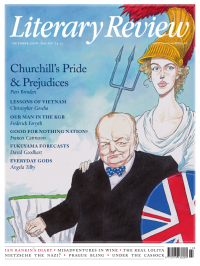John Tusa
The Villa’s Tale
The Last Palace: Europe’s Extraordinary Century Through Five Lives and One House in Prague
By Norman Eisen
Headline 403pp £25
This is the story of obsession with a building. It centres first on the man who built it, then on a man who was desperate to live in it, and finally on a man who saw living in it as the height of his career. Villa Petschek in Prague was the dream of the fabulously rich German-Jewish-Czech banker and coal-mine owner Otto Petschek, who conceived it after the end of the First World War. Possessed of seemingly limitless riches as a result of the postwar boom, Petschek dreamed up a house of insane eclecticism, paying tribute, as he saw it, to European architecture from ancient Greece and Rome through to the Italian Renaissance and the period of the French Baroque. He stuffed it with his magpie gleanings of objects and furniture from across the Continent. Dominating his architects, constantly changing his mind and the design, exhausting his builders, bullying his children, ignoring his wife’s feelings and possessing no discernible taste or aesthetic judgement, Petschek is as impossible to like as his villa is to admire, as far from the union of taste and money as it could be. Petschek’s ignorant tinkering took up eight years and almost broke the family bank. Two years after its completion, it broke him, and he collapsed and died. The villa says less about the wondrous city of Prague and its spirit than any other building I know.
Astonishingly, this piece of bombastic neoclassicism obsessed two US ambassadors: Laurence Steinhardt, who after the Second World War nagged the State Department into buying it to house the American embassy (his wife thought it looked like ‘an expensive brothel’), and the author of this book, Norman Eisen, who

Sign Up to our newsletter
Receive free articles, highlights from the archive, news, details of prizes, and much more.@Lit_Review
Follow Literary Review on Twitter
Twitter Feed
Johannes Gutenberg cut corners at every turn when putting together his bible. How, then, did his creation achieve such renown?
@JosephHone_ investigates.
Joseph Hone - Start the Presses!
Joseph Hone: Start the Presses! - Johannes Gutenberg: A Biography in Books by Eric Marshall White
literaryreview.co.uk
Convinced of her own brilliance, Gertrude Stein wished to be ‘as popular as Gilbert and Sullivan’ and laboured tirelessly to ensure that her celebrity would outlive her.
@sophieolive examines the real Stein.
Sophie Oliver - The Once & Future Genius
Sophie Oliver: The Once & Future Genius - Gertrude Stein: An Afterlife by Francesca Wade
literaryreview.co.uk
Princess Diana was adored and scorned, idolised, canonised and chastised.
Why, asks @NshShulman, was everyone mad about Diana?
Find out in the May issue of Literary Review, out now.
Literary Review - For People Who Devour Books
In the Current Issue: Nicola Shulman on Princess Diana * Sophie Oliver on Gertrude Stein * Costica Bradatan on P...
literaryreview.co.uk